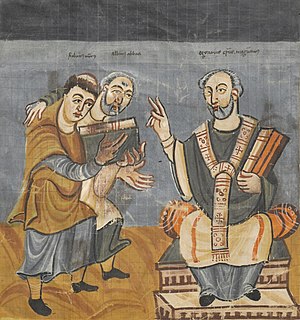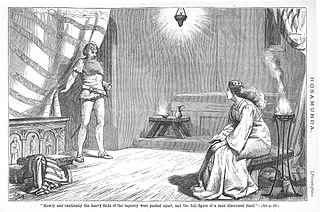
Alcuin of York – also called Ealhwine, Alhwin, or Alchoin – was an English scholar, clergyman, poet, and teacher from York, Northumbria. He was born around 735 and became the student of Archbishop Ecgbert at York. At the invitation of Charlemagne, he became a leading scholar and teacher at the Carolingian court, where he remained a figure in the 780s and 790s. "The most learned man anywhere to be found", according to Einhard's Life of Charlemagne, he is considered among the most important intellectual architects of the Carolingian Renaissance. Among his pupils were many of the dominant intellectuals of the Carolingian era.
Old English literature refers to poetry and prose written in Old English in early medieval England, from the 7th century to the decades after the Norman Conquest of 1066, a period often termed Anglo-Saxon England. The 7th century work Cædmon's Hymn is often considered as the oldest surviving poem in English, as it appears in an 8th-century copy of Bede's text, the Ecclesiastical History of the English People. Poetry written in the mid 12th century represents some of the latest post-Norman examples of Old English. Adherence to the grammatical rules of Old English is largely inconsistent in 12th-century work, and by the 13th century the grammar and syntax of Old English had almost completely deteriorated, giving way to the much larger Middle English corpus of literature.

Pavia is a town and comune of south-western Lombardy in northern Italy, 35 kilometres south of Milan on the lower Ticino river near its confluence with the Po. It has a population of c. 73,086. The city was the capital of the Kingdom of the Lombards from 572 to 774.

Aldhelm, Abbot of Malmesbury Abbey, Bishop of Sherborne, and a writer and scholar of Latin poetry, was born before the middle of the 7th century. He is said to have been the son of Kenten, who was of the royal house of Wessex. He was certainly not, as his early biographer Faritius asserts, the brother of King Ine. After his death he was venerated as a saint, his feast day being the day of his death, 25 May.

Gaius Sollius Modestus Apollinaris Sidonius, better known as Sidonius Apollinaris, was a poet, diplomat, and bishop. Sidonius is "the single most important surviving author from fifth-century Gaul" according to Eric Goldberg. He was one of four Gallo-Roman aristocrats of the fifth- to sixth-century whose letters survive in quantity; the others are Ruricius, bishop of Limoges, Alcimus Ecdicius Avitus, bishop of Vienne and Magnus Felix Ennodius of Arles, bishop of Ticinum. All of them were linked in the tightly bound aristocratic Gallo-Roman network that provided the bishops of Catholic Gaul. His feast day is 21 August.

The Cadaver Synod is the name commonly given to the ecclesiastical trial of Pope Formosus, who had been dead for about seven months, in the Basilica of St. John Lateran in Rome during January 897. The trial was conducted by Pope Stephen VI, the successor to Formosus' successor, Pope Boniface VI. Stephen had Formosus' corpse exhumed and brought to the papal court for judgment. He accused Formosus of perjury, of having acceded to the papacy illegally, and ruling over more than one place at a time. At the end of the trial, Formosus was pronounced guilty and his papacy retroactively declared null.
Flodoard of Reims was a Frankish chronicler and priest of the cathedral church of Reims in the West Frankish kingdom during the decades following the dissolution of the Carolingian Empire. His historical writings are major sources for the history of Western Europe, especially France, in the early and mid-tenth century.

Samuel Ward (1572–1643) was an English academic and a master at the University of Cambridge. He served as one of the delegates from the Church of England to the Synod of Dort.

Saint Paulinus II was a priest, theologian, poet, and one of the most eminent scholars of the Carolingian Renaissance. From 787 to his death, he was the Patriarch of Aquileia. He participated in a number of synods which opposed Spanish Adoptionism and promoted both reforms and the adoption of the Filioque into the Nicene Creed. In addition, Paulinus arranged for the peaceful Christianisation of the Avars and the alpine Slavs in the territory of the Aquileian patriarchate. For this, he is also known as the apostle of the Slovenes.

The Council of Frankfurt, traditionally also the Council of Frankfort, in 794 was called by Charlemagne, as a meeting of the important churchmen of the Frankish realm. Bishops and priests from Francia, Aquitaine, Italy, and Provence gathered in Franconofurd. The synod, held in June 794, allowed the discussion and resolution of many central religious and political questions.
The Gesta Berengarii imperatoris is a Latin epic poem chronicling the career of Berengar of Friuli, King of Italy from 887 and Emperor from 915. It follows Berengar's career from its inception until his imperial coronation in Rome in December 915. It is a court panegyric and highly laudatory of its namesake.
Hibernicus exul was an anonymous Irish Latin poet, grammarian, and dialectician. His works include a comic mock epic, a panegyric to Charlemagne, epigrams of advice to young scholars and a poetic overview of the seven liberal arts.

The Cambridge Songs are a collection of Goliardic medieval Latin poems found on ten leaves of the Codex Cantabrigiensis, now in Cambridge University Library.

The Carmen Campidoctoris is an anonymous medieval Latin epic poem, consisting of 32 accentual-syllabic Sapphic stanzas, for a total of 128 lines, with one line from an unfinished thirty-third. It is the earliest poem about the Spanish folk hero El Cid Campeador, and was found in the monastery of Santa Maria de Ripoll in the 17th century, after which it was transferred to the Bibliothèque nationale de France where it currently resides as manuscript lat. 5132.
Rythmusde Pippini regis Victoria Avarica, also known by its incipit as Omnes gentes qui fecisti, is a medieval Latin encomium celebrating the victory of King Pepin of Italy over the Avars in the summer of 796. It is associated with an experimental trend of the Carolingian Renaissance and, though its author, probably a cleric, is unknown, is associated with the Veronese "school" of poets, one of whom, at the same time, produced the Versus de Verona, praising the royal capital of Italy, where it and De Pippini were probably written.
Damian of Pavia was Bishop of Pavia (Ticinum) from 680, succeeding bishop Anastasius. He mediated relations between the Lombards and the Byzantine emperors.

Helmichis was a Lombard noble who killed his king, Alboin, in 572 and unsuccessfully attempted to usurp his throne. Alboin's queen, Rosamund, supported or at least did not oppose Helmichis' plan to remove the king, and after the assassination Helmichis married her. The assassination was assisted by Peredeo, the king's chamber-guard, who in some sources becomes the material executer of the murder. Helmichis is first mentioned by the contemporary chronicler Marius of Avenches, but the most detailed account of his endeavours derives from Paul the Deacon's late 8th-century Historia Langobardorum.
Wulfad was the archbishop of Bourges from 866 until his death. Prior to that, he was the abbot of Montier-en-Der and Soissons. He also served as a tutor to Carloman, a younger son of King Charles the Bald. Carloman succeeded Wulfad as abbot of Soissons in 860.
Durham, also known as De situ Dunelmi, Carmen de situ Dunelmi or De situ Dunelmi et de sanctorum reliquiis quae ibidem continentur carmen compositum, is an anonymous late Old English short poem about the English city of Durham and its relics, which might commemorate the translation of Cuthbert's relics to Durham Cathedral in 1104. Known from the late 12th-century manuscript, Cambridge, University Library, Ff. 1. 27, and generally considered to date from the first decade of the 12th century, Durham has been described both as "the last extant poem written in traditional alliterative Old English metrical verse" and as being placed "so conveniently on the customary divide between Old and Middle English that the line can be drawn right down the middle of the poem." Some scholars, however, consider that the poem might have been written as early as the mid-11th century.
In the Eastern Orthodox Church, the endemic synod or endemousa synodos was the permanent standing synod of bishops of the Patriarchate of Constantinople that met frequently but irregularly to deal with issues of discipline and dogma. It was convoked and presided over by the patriarch.